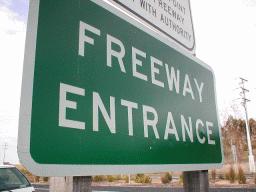Who put the “free” in “freeway”?
The motto of San Antonio toll road opponents is “Keep our FREEways free!” However, the term freeway doesn’t really mean that it’s free to drive on. Now admittedly my Webster’s New Collegiate Dictionary has “a toll-free highway” as its second definition for freeway. But that use is purely colloquial and can lead to a lot of misunderstandings when talking about toll roads. Besides, if that was the true definition of a freeway, then the little residential street in front of most of our homes would be a “freeway”, and we all instinctively know that that’s just not the case.
So then, just what is the definition of a freeway?
I’m glad you asked. Here is Webster’s first definition:
1: an expressway with fully-controlled access
They define expressway thusly:
a high-speed divided highway for through traffic with access partially or fully controlled and grade separations at important intersections with other roads.
The Federal Highway Administration (FHWA) combines the definitions:
A divided arterial highway designed for the unimpeded flow of large traffic volumes. Access to a freeway is rigorously controlled and intersection grade separations are required.
Say what?
Essentially, what both definitions are saying is that a freeway is a road that meets these criteria:
- Divided (has a median down the middle; in the case of a freeway, the median should not allow for crossovers except for official vehicles)
- Controlled-access (traffic can only enter or exit the road at designated locations, i.e. entrance and exit ramps)
- Grade-separated intersections (overpasses or underpasses at intersecting roadways)
Notice that the FHWA definition mentions nothing about tolls. This means, much to the chagrin of toll opponents, that most “tollways” are also technically “freeways”. Knowledgerush.com’s article on freeways puts it quite succintly:
Many non-engineers misapprehend the “free” in “freeway” to mean that such a highway must be free of charge to use.
Synonyms galore
Other terms used in lieu of freeway are expressway, thruway, turnpike, parkway, interstate, superhighway, and the generic highway. However, just as with the term freeway, most of those terms have other specific technical meanings. Some examples:
- A turnpike almost always is a toll road or former toll road (e.g. the Dallas-Ft. Worth Turnpike.)
- An expressway is actually one level below a freeway in the road hierarchy: it’s a road that is restricted-access, but may indeed have at-grade intersections, even signalized ones. These are especially popular in California. One example of such a road in the San Antonio area is Spur 422/SH 16 near Palo Alto College on the Southside, which is ironically– and incorrectly– named the Poteet-Jourdanton Freeway. It has signalized intersections at major cross-streets, but has access roads along both sides, thus restricting access from driveways and side streets. Short sections of the Wurzbach Parkway and Loop 1604 also qualify as an expressway. However, colloquial usage here and in other places equates the terms freeway and expressway.
- A highway is any major public roadway, usually maintained by the state. Lots of roads in San Antonio meet that definition, including Bandera Rd., Rigsby Ave., Military Dr., and the aptly-named Austin Highway and New Laredo Highway, just to name a few. In strict legal terms (TTC §541.302), a highway is any public roadway, including streets. However, in colloquial usage here in San Antonio and other places, the term highway is synonymous with freeway.
So in the road hierarchy, all freeways are also expressways, but not all expressways are freeways. And all freeways and expressways are highways, but not all highways are expressways or freeways. Got it?
What makes the freeway free?
So where does the “free” in freeway come from? A number of sources, including the Wikipedia article on freeways, indicate that the “free” in freeway comes from the concept that this type of road is designed to be “free-flowing” or “free of traffic signals/ intersections”. Understand that when the term was coined, controlled-access roadways were a new concept– they were going to free traffic from the scourge of red lights. One of my favorite quotes from the movie Who Framed Roger Rabbit is where Christopher Lloyd’s character is talking about how he stumbled upon a plan of “epic proportions” by the L.A. city council to build something called a “freeway”. While describing it to the others, he says “traffic jams will be a thing of the past.”
So am I just being pedantic about this or do I have a point?
I know the anti-toll motto is a cute play on words, but it perpetuates the false idea that freeways don’t cost anything. Just because you don’t have to physically throw money in a basket each time you use them doesn’t mean you’re not paying for them. So thinking that building a toll road is going to take away something you’re getting for free today is a fallacy. Also, I believe that folks who are debating highway issues should at least get the lingo right; if we’re not all speaking the same language, how can we expect to communicate?
Links:
- Wikipedia: freeway; expressway; highway
- Knowledgerush: freeway
- The Expressway site
- YouTube: Who Framed Roger Rabbit? The Rise of Automobiles & Freeways!
